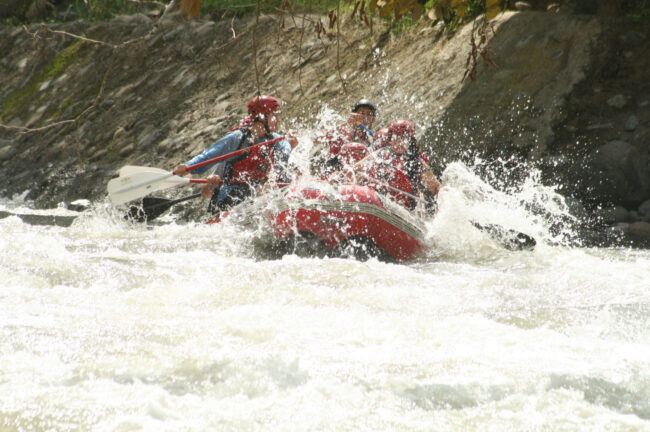Posts Tagged ‘no regrets’
Rafting Life’s River of Regrets and Resolutions
“Non! Rien de rien … Non, Je ne regrette rien.”
With these words, Edith Piaf sings and proclaims a life of no regrets for the good and bad times she’s had, for her ups and downs, her sorrows and pleasures. It’s a powerful anthem, but the binary of no regrets versus regret is too stark a contrast for the reality of complex lives and complicated life journeys.
Similarly, the boastful, defiant, and defensive posturing of Paul Anka’s “Regrets, I’ve had a few. But then again, too few to mention” is also unsatisfying. The insistence that “I did it my way” elides any notion of factors that are beyond our control and circumstances that constrain our ability to act.
In terms of my own life, regrets for opportunities that didn’t come together or that I let elude my grasp haunt me.
If I had been accepted into the MA programme in History at UBC or if my application to law school had been successful in the early 1980s, I would have likely built a multi-decade career by now in either academia or law. Of course, I have found my way back to academia and am a better scholar today than I would have been as a 22-year-old, but it is difficult balancing the reality of being a mature woman with that of being a junior scholar.

I resigned my position with Expo 86 before the fair opened. I was an early hire and one of the original hostesses that welcomed guests to the display pavilion before moving over to the Expo Centre, better known today as Vancouver’s Science World. If I had persevered and accepted the boredom and circumscribed responsibility of my role at that time for the benefit of experiencing the world’s fair as an insider, would I have established a network that allowed me to work at other events around the world? On the other hand, I’ve been fortunate enough to travel to different countries without the obligation of working while away.
Before returning to Vancouver from Toronto in 1992, I tried to secure a position with Rogers Cablesystems, my employer at the time, but they didn’t come through with an offer until after I’d made another commitment. What would have happened if they had made the offer sooner and I had been a part of Rogers’s pay-per-view initiative? What if I had listened to Jerry Beckerman, a family friend and well-connected political strategist, and sought the nomination for a nearby riding when the incumbent MLA decided not to run for re-election? What if I had been more diligent in pitching stories when I was writing food and travel articles, with pieces appearing in the North Shore Outlook, The Georgia Straight, and other publications? What if I had followed up with the editor from Gourmet who gave me his card when I attended a weekend of culinary workshops and events in New York, which the magazine had organized?
This process of self-reflection is necessary, ongoing, and can’t merely be an end-of-days reckoning. In Oedipus Rex, Sophocles writes, “Now as we keep our watch and wait the final day, count no man happy till he dies, free of pain at last.” While crossing that final frontier may mean an end to pain, if we can’t find comfort and happiness until we die, then life is an empty, joyless exercise. Sophocles reflected the mentality of his era, one in which society viewed humans as playthings of the gods. Many today entertain similar notions of fate. However, to believe that life is a matter of God’s will is to embrace the simplicity of an answer rather than the complexity of a quest.
As I see it, the resolution of my life’s trajectories brings me to this point, this present, this now. It seems to me that taking the measure of one’s life, regrets and all, is about the ability to say “okay, I’m good here and I will continue to strive.” It is an eternal balance between letting go and holding on because to have no regrets is a life without learning and to wallow in regrets is a life without purpose.
The current Covid19 global pandemic has tugged us further into living in and for the moment. It also shines a glaring spotlight on systemic injustices and inequities that allow people with privilege to stay home rather than negotiating the frontlines and trenches of in-person work. This reinforces my belief that the greatest privilege is the privilege of mobility, the ability to move between spheres of existence whether physical, emotional, social, geographical, intellectual, or economic. That’s why boxing people into hierarchical slots and labelling them as this or that is an act of oppression. It denies individuals the right to move across boundaries and between spaces, in a material as well as a metaphorical sense, perpetuating existing power structures and historical patterns of domination.
While it is easy for me to opine about the life I’ve lived, in a blog post of over 1,000 words, it also projects a certainty and confidence I don’t feel. Rather, take this writing as evidence of what we all have to do. We all have to sit with the unease and discomfort of a future we don’t control and a past we can’t forget.
For me, in this moment and stage of life, I know I am more comfortable with myself, if not at ease. I have come to terms with who I am and what I have done although I am continually questioning my understandings. I’m still sorting out where I want to go from here, why and how. I recognize that there are decisions and commitments that I will have to make although many factors are beyond my control. I also know that I have to continue to be aware and reflective, to strive and to move. I can never ever get so submerged into myself that I fail to recognize my privilege, forget to be grateful for all I have, and make the mistake of thinking my experience stands in for everyone else’s.
The actions I take may not change the world or shape current events, but I need to do what I can — we all need to do what we can — to make things better for ourselves, our friends, our families, our communities, and our world. It’s about the stake we have in lifting up humanity as a collective. The loss of that collective vision or limiting our collective vision to those who look like us and live like us, is the greatest threat to our future. As we survey the regrets and resolutions of our lives, as we raft the rapids of our existence, it is our obligation and responsibility to ensure others can do so, too, safely, with dignity, integrity, and the knowledge that they are valued and valuable.
Ruminating On Paths Taken And Not Taken
Today the BC Supreme Court released a decision which finds changes made to the collective agreement with teachers in British Columbia, specifically those around class size and composition, unconstitutional. In addition, the court awarded the British Columbia Teachers’ Federation (BCTF) $2 million in damages which the provincial government must now pay.
That’s what I should probably talk about today given my role in BC’s public education system, but there are too many unknowns at this point, including the government’s response, and I don’t have enough details for an informed comment.
Not that I have answers to the other topic which I’ve been pondering.
George Bernard Shaw famously said, “Youth is wasted on the young” and we often hear the phrase, “If I only knew then what I know now.”
In a similar vein, I’ve thought of this: there is no undo/redo.
Computer programs have undo/redo, commands that allow us to zip back and forth in our work or our game to the point before we made an error or made a choice which we no longer support or chose a path which has not led us to the desired outcome.
In life, however, there is no undo/redo. As much as people advocate for a philosophy of “no regrets” I think that’s simplistic and difficult to apply in our own lives.
Why?
Because if we are honest with ourselves, there are regrets. We recognize points along the way where we made choices which were not good ones or decisions which didn’t play out the way we hoped they might or where we passed up an opportunity which, with hindsight, we think may have worked out better although there’s never any guarantee it would have.
I also think the idea of living in the moment, while it has merits, is not the answer either because we are not creatures of the moment: we have a past that has shaped us and we have a future which beguiles us.
The question becomes how to reconcile ourselves with our choices and with their outcomes.
It’s difficult to do when we hit those bumps in the road where each and every decision is up for evaluation. Where the “what-if” game becomes the one haunting us in the present. Where our confidence and our understanding of who we are takes on the metaphorical aspect of a cannibal rat ghost ship.
And we’re lucky if we find our way before circumstances intervene to make a situation worse or to take the journey along life’s path out of our control.
And while there is no undo/redo, there is try which puts me at odds with Yoda, the Jedi Master in Star Wars. With deference to the green sage, sometimes all we can count on is try.
Because without try, there is no possibility of change.
And change, according to ancient philosophies, is the only constant.
